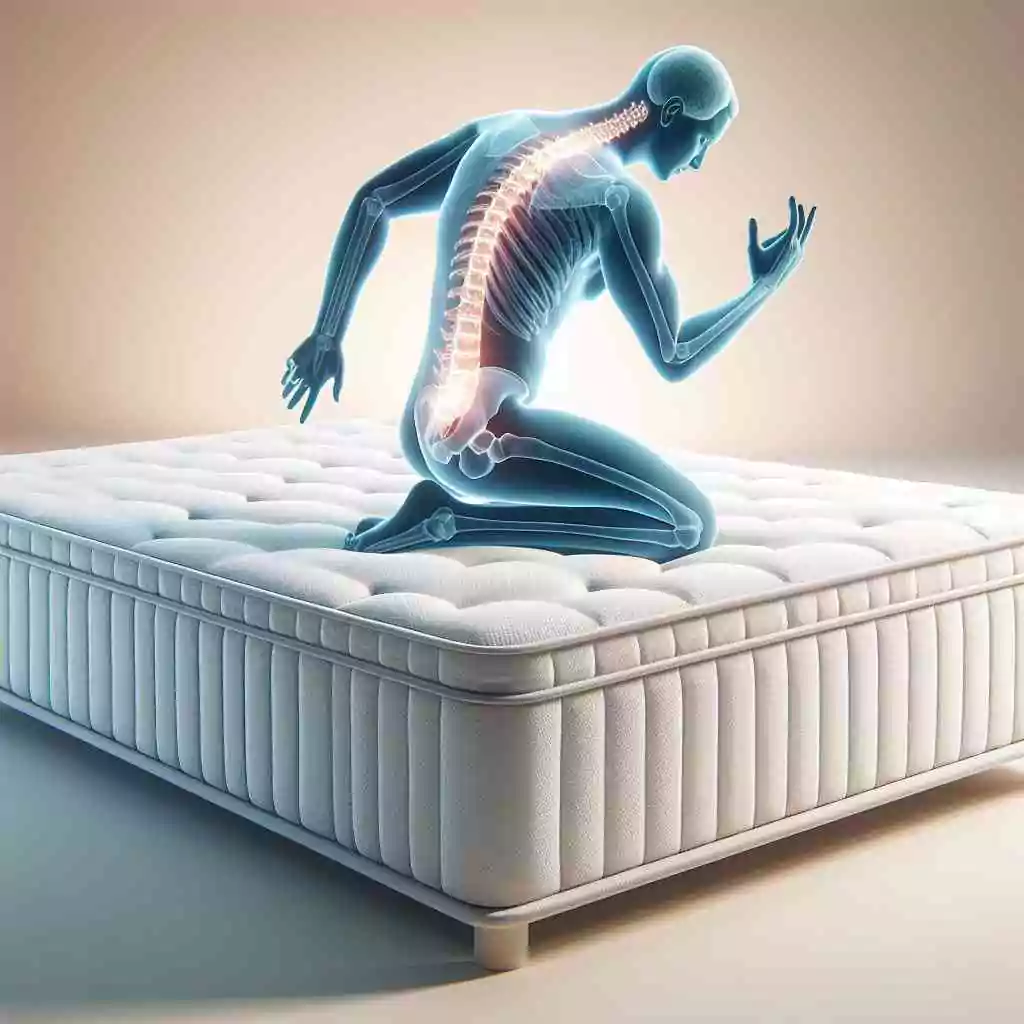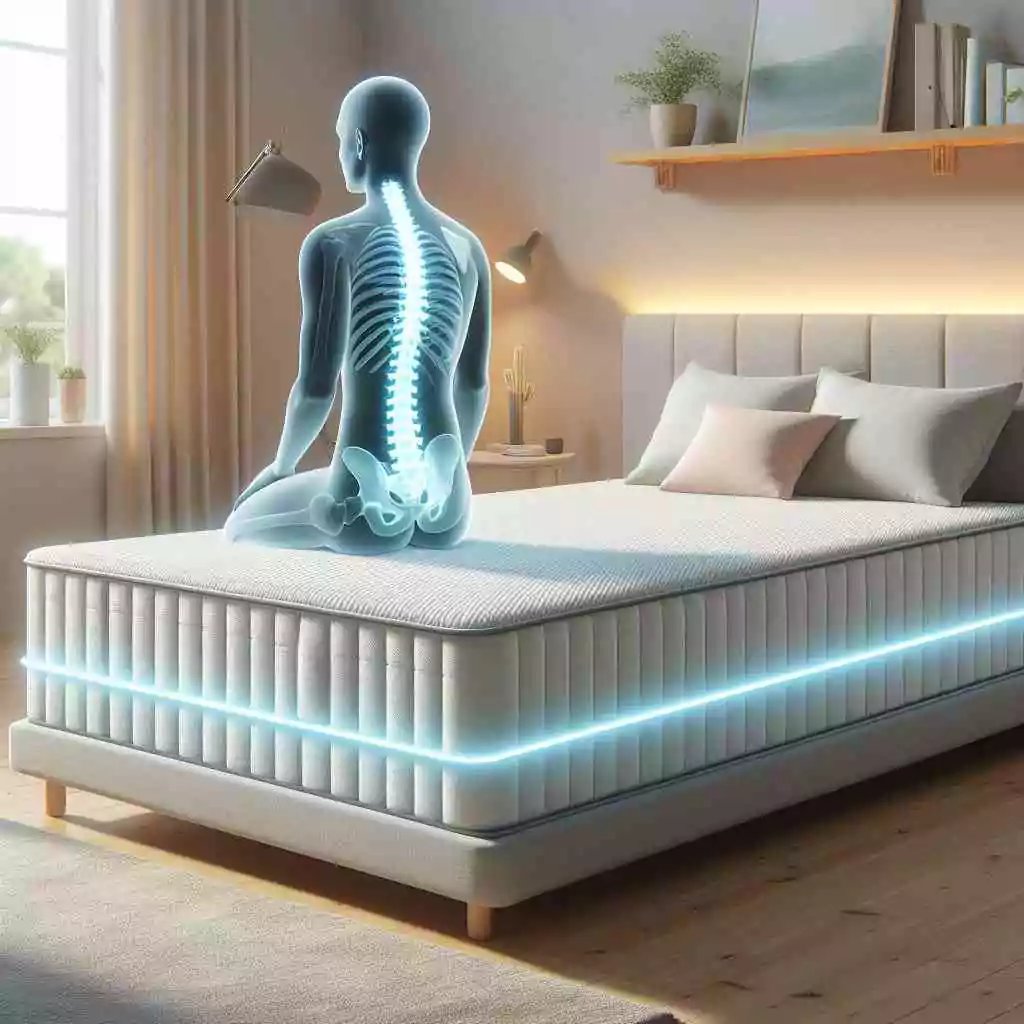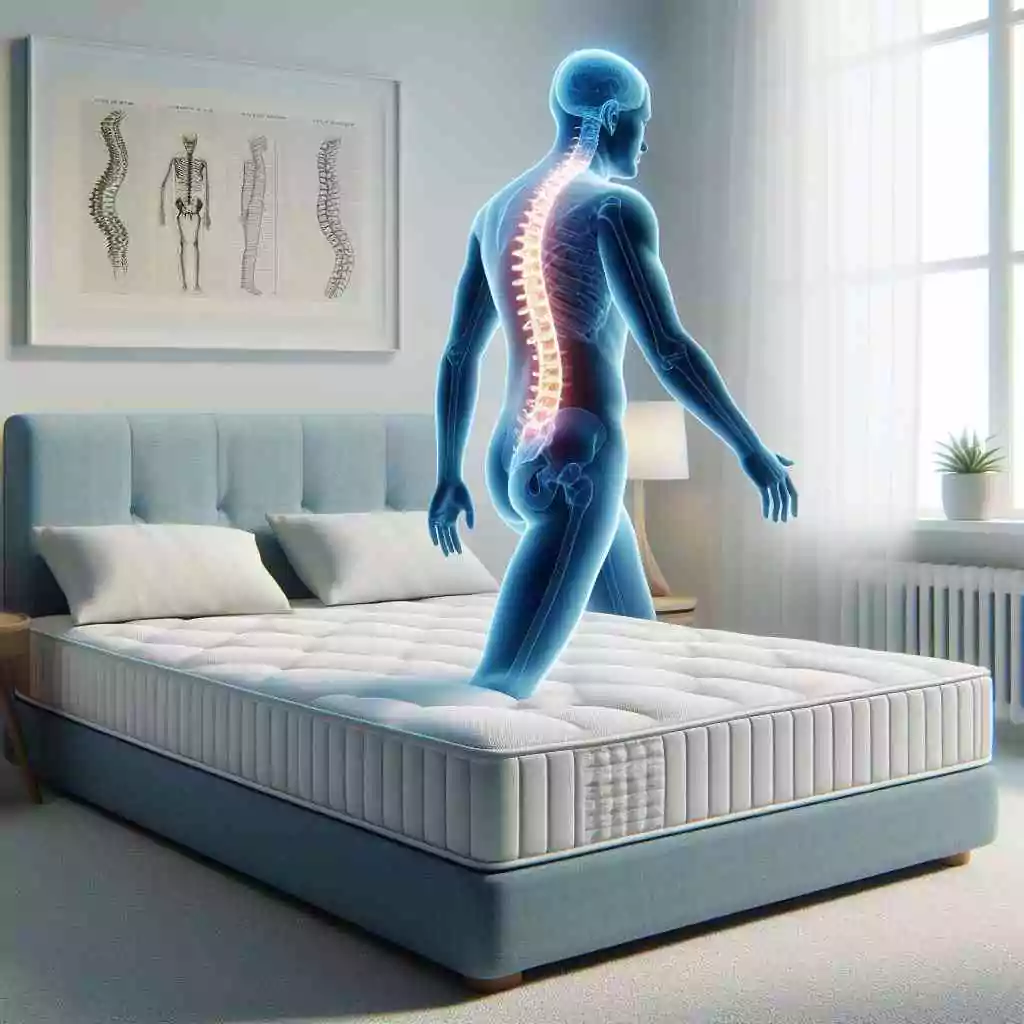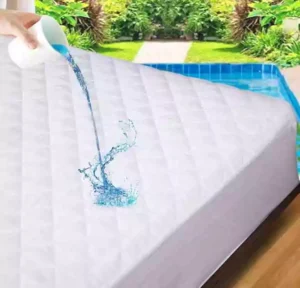If you suffer from ankylosing spondylitis (AS), you know how hard it can be to get a good night’s sleep. AS is a chronic inflammatory condition that affects the spine and other joints, causing pain, stiffness, and reduced mobility. It can also affect your sleep quality, making you feel tired, irritable, and depressed.
But don’t lose hope. You can improve your sleep quality and overall health by choosing the right mattress. A good mattress can make a massive difference in AS relief, providing the support, comfort, and pressure relief your spine and joints need. It can also help you maintain a healthy posture, reduce inflammation, and promote blood circulation.
But how do you choose the best mattress for AS? What factors should you consider? What types of mattresses are best for AS patients? And what are some of the top mattresses for AS relief on the market today?
In this article, we will answer all these questions and more. We will also share some tips on improving your sleep quality with AS and making the most of your mattress investment. By the end of this article, you will better understand how to choose the best mattress for AS relief and how to enjoy a restful and rejuvenating sleep every night.
Table of Contents
Understanding Ankylosing Spondylitis and Its Impact on Sleep
Ankylosing spondylitis (AS) is a type of arthritis that mainly affects the spine but can also affect other joints, such as the hips, knees, shoulders, and ribs. It causes inflammation and swelling of the joints, leading to pain, stiffness, and reduced mobility. Over time, AS can also cause the vertebrae to fuse, resulting in a rigid and hunched posture.
AS is a chronic and progressive condition, meaning that it can worsen over time and has no cure. However, it can be managed with medication, physical therapy, and lifestyle changes. The symptoms of AS can vary from person to person and fluctuate depending on the stage and severity of the condition.
One of the most common and debilitating symptoms of AS is poor sleep quality. AS can affect
your sleep quality in several ways, such as:
- Causing pain and discomfort that can make it hard to fall asleep or stay asleep
- Reducing your range of motion and flexibility, making it difficult to find a comfortable sleeping position
- Increasing your sensitivity to pressure and temperature, making you feel too hot or too cold
- Affecting your breathing and circulation, leading to snoring, sleep apnea, or restless legs syndrome

- Triggering inflammation and immune responses, causing fatigue, headaches, and mood swings
Poor sleep quality can negatively impact physical, mental, and emotional health. It can worsen AS symptoms, lower the immune system, increase the risk of chronic diseases, impair cognitive function, and affect mood and well-being.
That’s why improving your sleep quality is crucial if you have AS. And one of the best ways to do that is to choose the right mattress.
The Role of a Mattress in AS Relief
A mattress is more than just a surface to sleep on. It’s a vital component of your sleep environment, and it can significantly affect your sleep quality and AS symptoms. A good mattress can provide the following benefits for AS relief:
- Support: A good mattress can support your spine and joints, keeping them neutral and aligned. This can help prevent or reduce pain, stiffness, and inflammation and improve your posture and mobility.
- Comfort: A good mattress can also provide comfort and cushioning for pressure points such as your hips, shoulders, and lower back. This can help relieve pressure and tension and promote blood circulation and relaxation.
- Temperature regulation: A good mattress can also regulate your body temperature, keeping you cool and comfortable throughout the night. This can help prevent
overheating, sweating, and discomfort and reducing inflammation and immune responses.
However, not all mattresses are created equal. Some mattresses may be too firm or soft, too hot or cold, too saggy or too bouncy, or too old or too new for your needs. That’s why choosing a mattress that suits your preferences, sleeping style, and AS condition is essential.

Choosing the Best Mattress for AS: A Comprehensive Guide
So, how do you choose the best mattress for AS relief? There are many factors to consider, such as:
- Your body type and weight: Your body type and weight can affect how you feel on a mattress and how much support and comfort you need. Generally, heavier people need more support and firmness, while lighter people need more comfort and softness. Your body shape and distribution can also affect your sleep, as some areas may need more or less pressure relief than others.
- Your sleeping position: Your sleeping position can also affect how you feel on a mattress and how much support and comfort you need. Generally, side sleepers need more comfort and pressure relief, especially for their hips and shoulders. In contrast, back and stomach sleepers need more support and firmness, especially for their lower back and spine. Your sleeping position can also change depending on your AS symptoms, so you may need a mattress accommodating different positions.

- Your AS symptoms and stage: Your AS symptoms and stage can also affect how you feel on a mattress and how much support and comfort you need. Generally, people with more severe or advanced AS need more support and firmness, while people with milder or early AS need more comfort and softness. Your AS symptoms can also fluctuate depending on the time of day, the weather, or medication, so you may need a mattress that can adapt to your changing needs.
- Your personal preferences: Your personal preferences can also affect how you feel on a mattress and how much support and comfort you need. Some people may prefer a firmer or softer feel, a cooler or warmer feel, a bouncier or more conforming feel, or a more natural or synthetic feel. Your preferences can also depend on your lifestyle, budget, or environmental concerns.
- You may need a mattress matching your values and goals.
Once you have considered these factors, you can narrow down your options by looking at the different types of mattresses available. There are four main types of mattresses: memory foam, latex, innerspring, and hybrid. Each type has its pros and cons and is suitable for AS relief.
Memory Foam Mattresses
Memory foam mattresses are made of a viscoelastic material that conforms to your body shape and weight, creating a customized and cradling feel. Memory foam mattresses are known for their excellent pressure relief, motion isolation, and noise reduction, making them ideal for side sleepers, couples, and light sleepers. However, memory foam mattresses can also trap heat, emit odors, and sag over time, making them less ideal for hot, sensitive, and heavy sleepers.
Memory foam mattresses can be a good choice for AS relief, as they can provide comfort and cushioning for your pressure points and support and alignment for your spine and joints.
However, memory foam mattresses can also be too soft or too conforming for some AS patients, especially those who need more firmness, support, or mobility. Therefore, choosing a memory foam mattress with the right firmness, density, and thickness is essential for your needs.
Some of the best memory foam mattresses for AS relief are:
- Puffy Mattress: The Puffy Mattress is a memory foam mattress with a three-layer design consisting of a cooling gel-infused memory foam layer, a transitional polyfoam layer, and a high-density polyfoam base layer. The Puffy Mattress has a medium (5) firmness, a 10-inch thickness, and a breathable polyester cover. The Puffy Mattress is designed to provide a balanced feel of comfort and support, as well as temperature regulation and pressure relief. The Puffy Mattress suits most AS patients, especially those who sleep on their side, back, or stomach and weigh less than 230 pounds. The Puffy Mattress also comes with a 101-night sleep trial, a lifetime warranty, and free shipping and returns in the contiguous U.S.

- Nectar Mattress: The Nectar Mattress is a memory foam mattress with a four-layer design consisting of a quilted memory foam cover, a gel-infused memory foam layer, a transitional memory foam layer, and a high-density polyfoam base layer. The Nectar Mattress has a medium-firm (6) firmness, an 11-inch thickness, and a Tencel lyocell and cotton cover. The Nectar Mattress is designed to provide a contouring and supportive feel, pressure relief, and motion isolation. The Nectar Mattress is suitable for most AS patients, especially those who sleep on their side or back and weigh between 130 and 230 pounds. The Nectar Mattress also has a 365-night sleep trial, a lifetime warranty, and free shipping and returns in the contiguous U.S.

Latex Mattresses
Latex mattresses are made of a natural or synthetic rubber material that responds to your body shape and weight, creating a resilient and bouncy feel. Latex mattresses are known for their durability, breathability, and they have hypoallergenic properties, making them ideal for eco-conscious sleepers, hot sleepers, and allergy sufferers. However, latex mattresses can also be expensive, heavy, and firm, making them less suitable for budget-conscious, lightweight, and pressure-sensitive sleepers.
Latex mattresses can be a good choice for AS relief, as they can provide support and alignment for your spine and joints and comfort and cushioning for your pressure points. However, latex mattresses can also be too firm or too bouncy for some AS patients, especially those who need more softness, conforming, or motion isolation. Therefore, choosing a latex mattress with the right firmness, density, and thickness is essential for your needs.
Some of the best latex mattresses for AS relief are:
- Saatva Zenhaven: The Saatva Zenhaven is a latex mattress with a flippable design, offering two firmness options: gentle firm (7) and luxury plush (4). The Saatva Zenhaven has a 10-inch thickness and consists of four layers of natural Talalay latex, organic wool, and organic cotton. The Saatva Zenhaven is designed to provide a responsive and breathable feel, pressure relief, and spinal alignment. The Saatva Zenhaven is suitable for most AS patients, especially those who sleep on their side, back, or stomach and weigh between 130 and 230 pounds. The Saatva Zenhaven also has a 180-night sleep trial, a 20-year warranty, and free white glove delivery and mattress removal in the contiguous U.S.
- PlushBeds Botanical Bliss: The PlushBeds Botanical Bliss is a latex mattress with a customizable design, allowing you to adjust the firmness and thickness of the bed by rearranging the internal layers. The PlushBeds Botanical Bliss has three thickness options, 9, 10, and 12 inches, and two firmness options: medium (5) and medium-firm (6). The PlushBeds Botanical Bliss consists of three or four layers of natural Dunlop latex, organic wool, and organic cotton. The PlushBeds Botanical Bliss is designed to provide a durable and natural feel, pressure relief, and temperature regulation. The PlushBeds Botanical Bliss is suitable for most AS patients, especially those who sleep on their side, back, or stomach and weigh more than 130 pounds. The PlushBeds Botanical Bliss also comes with a 100-night sleep trial, a 25-year warranty, and free shipping and returns in the contiguous U.S.
Hybrid Mattresses
Hybrid mattresses combine foam or latex with innerspring coils, offering the best of both worlds. They are known for their versatility, as they can provide comfort, support, bounce, and breathability, making them ideal for a variety of sleepers and preferences. However, hybrid mattresses can also be expensive, heavy, and noisy, making them less ideal for budget-conscious, lightweight, and sensitive sleepers.
Hybrid mattresses can be a good choice for AS relief, as they can provide support and alignment for your spine and joints and comfort and cushioning for your pressure points. However, depending on the quality and composition of the materials, hybrid mattresses can also be too firm or too soft, too hot or too cold, or too saggy or too bouncy for some AS patients. Therefore, choosing a hybrid mattress with the right firmness, density, thickness, and coil count is essential for your needs.
Some of the best hybrid mattresses for AS relief are:
- Zoma Hybrid: The Zoma Hybrid is a hybrid mattress that features a four-layer design consisting of a gel-infused memory foam layer, a transitional polyfoam layer with zoned support, a pocketed coil layer, and a high-density polyfoam base layer. The Zoma Hybrid has a medium (6) firmness, a 12-inch thickness, and a breathable polyester cover. The Zoma Hybrid is designed to provide a responsive and cooling feel, pressure relief, and motion isolation. The Zoma Hybrid is suitable for most AS patients, especially those who sleep on their side, back, or stomach and weigh between 130 and 230 pounds. The Zoma Hybrid also has a 100-night sleep trial, a 10-year warranty, and free shipping and returns in the contiguous U.S.
- WinkBed: The WinkBed is a hybrid mattress that features a five-layer design consisting of a quilted Tencel cover, a gel-infused polyfoam layer, a micro-coil layer, a zoned pocketed coil layer, and a high-density polyfoam base layer. The WinkBed has four firmness options: soft (4), medium-firm (6.5), firm (7.5), and (8). The WinkBed has a 13.5-inch thickness and an optional pillow top for extra comfort. The WinkBed is designed to provide a luxurious and supportive feel, pressure relief, and temperature regulation. The WinkBed is suitable for most AS patients, especially those who sleep on their side, back, or stomach and weigh more than 130 pounds. The WinkBed also comes with a 120-night sleep trial, a lifetime warranty, and free shipping and returns in the contiguous U.S.
Innerspring Mattresses
Innerspring mattresses are traditional mattresses that use metal coils as the central support system. Innerspring mattresses are known for their affordability, availability, and bounce, making them ideal for budget-conscious, easy-to-find, and active sleepers. However, innerspring mattresses can also be noisy, prone to sagging, and lack pressure relief, making them less ideal for sensitive, durable, and pressure-sensitive sleepers.
Innerspring mattresses can be a good choice for AS relief, as they can provide support and alignment for your spine and joints and comfort and cushioning for your pressure points. However, innerspring mattresses can also be too firm or too soft, too hot or too cold, or too saggy or too bouncy for some AS patients, depending on the quality and composition of the coils. Therefore, choosing an innerspring mattress with the right firmness, coil count, coil gauge, and coil type is essential for your needs.
Some of the best innerspring mattresses for AS relief are:
- Saatva Classic: The Saatva Classic is an innerspring mattress that features a five-layer design consisting of a quilted organic cotton cover, a memory foam layer, a polyfoam layer, a dual-layer of pocketed coils and Bonnell coils, and a high-density polyfoam base layer. The Saatva Classic has three firmness options: plush soft (3), luxury firm (6), and firm (8). The Saatva Classic has an 11.5-inch or 14.5-inch thickness and an optional pillow top for extra comfort. The Saatva Classic is designed to provide a luxurious and supportive feel, pressure relief, and temperature regulation. The Saatva Classic suits most AS patients, especially those who sleep on their side, back, or stomach and weigh more than 130 pounds. The Saatva Classic also has a 180-night sleep trial, a 15-year warranty, and free white glove delivery and mattress removal in the contiguous U.S.

- WinkBed Plus: The WinkBed Plus is an innerspring mattress designed for heavier sleepers weighing more than 300 pounds. The WinkBed Plus features a four-layer design consisting of a Tencel cover, a latex layer, a zoned pocketed coil layer, and a high-density polyfoam base layer. The WinkBed Plus has a firm (8) firmness, a 13.5-inch thickness, and an optional pillow top for extra comfort. The WinkBed Plus is designed to provide a durable and supportive feel, pressure relief, and temperature regulation. The WinkBed Plus suits most AS patients, especially those who sleep on their side, back, or stomach and weigh more than 300 pounds. The WinkBed Plus also has a 120-night sleep trial, a lifetime warranty, and free shipping and returns in the contiguous U.S.

Top Mattress Features for AS Relief
Now that you have an idea of the different types of mattresses and how they can affect your AS symptoms, you may be wondering what the specific features are that you should look for when choosing a mattress for AS relief. Here are some of the most essential features that can make a difference in your sleep quality and your AS symptoms:
- Firmness: The firmness of a mattress refers to how hard or soft it feels when you lie on it. The firmness of a mattress can affect your comfort, support, and pressure relief, as well as your spinal alignment and posture. The ideal AS relief firmness depends on your preference, body type, weight, and sleeping position. Still, generally, a medium-firm to firm mattress is recommended, as it can provide adequate support and alignment for your spine and joints while still being comfortable and cushioning for your pressure points. A mattress that is too firm can cause pressure points and pain, while a mattress that is too soft can cause sagging and misalignment.
- Support: The support of a mattress refers to how well it can keep your spine and joints in a neutral and aligned position. The support of a mattress can affect your pain, stiffness, and inflammation, as well as your posture and mobility. The ideal support for AS relief depends on your body type, weight, and sleeping position. Still, generally, a mattress that can provide consistent and even support across the entire surface is recommended, as it can prevent or reduce pain, stiffness, and inflammation and improve your posture and mobility. A mattress that is too supportive can cause pressure points and discomfort, while a mattress that is not supportive enough can cause sagging and misalignment.
- Comfort: The comfort of a mattress refers to how well it can conform to your body shape and weight, creating a cradling and cozy feel. The comfort of a mattress can affect your pressure relief, blood circulation, and relaxation, as well as your sleep quality and well-being. The ideal comfort for AS relief depends on your preference, body type, weight, and sleeping position. Still, generally, a mattress that can provide adequate comfort and cushioning for your pressure points, such as your hips, shoulders, and lower back, is recommended, as it can relieve pressure and tension and promote blood circulation and relaxation. A mattress that is too comfortable can cause overheating and sweating, while a mattress that is not comfortable enough can cause pressure points and pain.
Tips for Improving Sleep Quality with AS
Besides choosing the right mattress for AS relief, there are other things you can do to improve your sleep quality and your overall health. Here are some tips that can help you sleep better with AS:
- Exercise regularly: Exercise can help you manage your AS symptoms, as well as improve your mood, energy, and sleep quality. Exercise can also reduce inflammation, pain, and stiffness and improve your posture and mobility. Aim for at least 150 minutes of moderate-intensity aerobic exercise and two weekly strength training sessions, as the American College of Rheumatology recommends. You can also try low-impact exercises, such as swimming, cycling, or yoga, that are gentle on your joints and muscles. However, avoid exercising too close to bedtime, as it can make you too alert and interfere with your sleep.
- Follow a healthy diet: Eating a balanced and nutritious diet can help you manage your AS symptoms, boost your immune system, lower your risk of chronic diseases, and enhance your sleep quality. Eating a healthy diet can also help you maintain a healthy weight, reducing the pressure and strain on your joints and spine. Try to eat more fruits, vegetables, whole grains, lean proteins, and healthy fats, and limit your intake of processed foods, added sugars, salt, and alcohol. You can also consult a nutritionist or a dietitian for more guidance on what to eat and avoid for AS relief.
- Manage your stress: Stress can worsen your AS symptoms, as well as affect your mood, cognition, and sleep quality. Stress can also trigger inflammation and immune responses, which can cause fatigue, headaches, and mood swings. Therefore, it’s essential to manage your stress levels and cope with your emotions in healthy ways. Before bedtime, you can try relaxation techniques, such as deep breathing, meditation, or progressive muscle relaxation, to calm your mind and body. You can also seek professional help, such as counseling or therapy if you feel overwhelmed or depressed by your condition.

- Maintain good sleep hygiene: Good sleep hygiene refers to the habits and practices that can help you sleep better and more consistently. Some examples of good sleep hygiene are:
- Stick to a regular sleep schedule, and try to go to bed and wake up at the same time every day, even on weekends and holidays.
- Avoid caffeine, nicotine, and alcohol, especially in the evening, as they can stimulate your nervous system and disrupt sleep.
- Avoid naps, especially in the afternoon, as they can interfere with your sleep cycle and make it harder to fall asleep at night.
- Create a comfortable and relaxing sleep environment, and make sure your bedroom is dark, quiet, calm, and free of distractions, such as TV, phone, or computer.
- Follow a relaxing bedtime routine and do something that helps you unwind and relax, such as reading, listening to music, or taking a warm bath.
- Avoid using your bed for anything other than sleep and sex, and train your brain to associate your bed with sleep and intimacy, not with work, entertainment, or stress.
Conclusion
Ankylosing spondylitis (AS) is a chronic inflammatory condition that affects the spine and other joints, causing pain, stiffness, and reduced mobility. It can also affect sleep quality, making people tired, irritable, and depressed.
But you don’t have to suffer from poor sleep quality and its consequences. You can improve your sleep quality and overall health by choosing the right mattress for AS relief and following some tips and strategies to manage your AS symptoms and enhance your sleep environment.
A good mattress can provide the support, comfort, and pressure relief that your spine and joints need and help you maintain a healthy posture, reduce inflammation, and promote blood circulation. Different types of mattresses are available on the market, such as memory foam, latex, hybrid, and innerspring, and each type has its pros and cons, as well as its suitability for AS relief. Therefore, choosing a mattress that suits your preferences, sleeping style, and AS condition is essential.
You can also improve your sleep quality and overall health by exercising regularly, following a healthy diet, managing your stress, and maintaining good sleep hygiene. These habits and practices can help you manage your AS symptoms and improve your mood, energy, and well-being.
Sleep is essential for your health and happiness, and you deserve to enjoy a restful and rejuvenating sleep every night. By choosing the right mattress for AS relief and following some tips and strategies to improve your sleep quality, you can transform your sleep experience and your life.
FAQ
Is a hard or soft mattress better for ankylosing spondylitis?
Neither. A hard mattress can be too rigid and a soft mattress can be too saggy for your spine. You need a medium-firm mattress that can provide support and comfort for your joints and pressure points. Goldilocks would approve.
What kind of mattress is good for spondylitis?
A memory foam or latex mattress can be good for spondylitis, as they can conform to your body shape and weight, and relieve pressure on your spine and pelvis. They also have good motion isolation, so you won’t disturb your partner if you toss and turn. Just make sure you’re not allergic to latex.
What firmness of mattress is best for arthritis?
A medium-firm mattress is best for arthritis, as it can provide the optimal balance between support and cushioning. A mattress that is too firm can cause pressure points and pain, while a mattress that is too soft can cause sagging and misalignment. A medium-firm mattress can help you maintain a healthy posture and reduce inflammation.
What should you not do with ankylosing spondylitis?
There are a few things you should avoid or limit if you have ankylosing spondylitis, such as: Contact sports or activities that can strain your back or joints, such as heavy lifting without proper technique. You don’t want to make your condition worse by injuring yourself. Smoking, alcohol, and processed foods. These can worsen your inflammation, pain, and stiffness, and also increase your risk of other health problems. You’re better off quitting smoking, limiting alcohol, and eating a balanced and nutritious diet. Sedentary lifestyle and poor posture. These can aggravate your symptoms and lead to spine fusion and reduced mobility. You should exercise regularly, practice good posture, and take breaks to move around and stretch your back.



